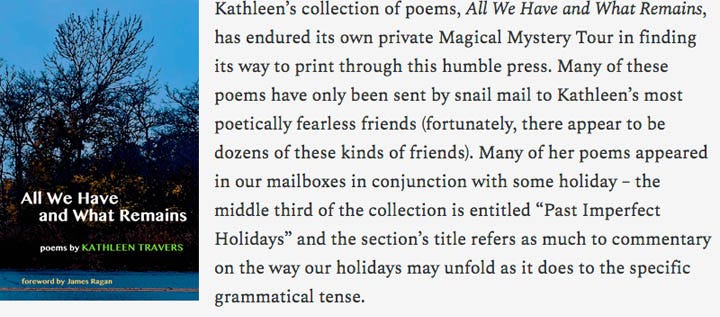The first time I introduced Kathleen Travers to a crowd, which was not long ago (shortly after she had been named Poet Laureate of the Foothills), I was determined to recount everything great that she had ever done for me.
But after fifteen minutes, the host for the event gave me the hand signal that indicated I should speed things up.
That threw me off, because I was going chronologically, and I had only reached 1987. I still had thirty-seven years of generosity to go!
A poet from India once told me that Poetry is Magic, and added that Americans, who err on the complementary sides of science and superstition, often spurn Poetry because they are fearful of inviting genuine Magic into their lives. I had already heard that Poetry is Magic – WH Auden said it – and, because of lifelong friends like Kathleen, I already knew it anyway. A poet gives you a gift and off you go: the gift, no matter how slight, has already found a way to matter to you now, and will matter to you forty, fifty years from now as much as it does to-day.
I really feel like saying that if you don’t get a copy of this book, you’re missing out on some of the Magic Generosity that I have known for over forty years. But that’s far too presumptuous, and I know you’ve found your own Magic Potions by now anyway. But also know that in the spirit of such wanton levels of Magic, curating the advance praise for this book wasn’t really work at all; one waving of the wand and it was all there, already honest and forthcoming, only needing to be formalized.
Poet Timothy Steele called Travers’ work “sympathetic and insightful portraits of gentle spirits who make do in defiance of tyrannical people and rotten luck . . . Travers reminds us that the meek do inherit the earth, making it a place where intelligence and kindness outlast the illusory triumphs of the greedy and powerful.”
“Here is the joyous wisdom captured on the run by a very talented, funny, and understated poet. Seldom is pleasure and insight so seamlessly articulated in poems that capture a lifetime of awakenings,” my friend Robert Inchausti, professor emeritus at California Polytechnic State University, San Luis Obispo and author of The Pocket Thomas Merton, offered the press.
LA poet and co-founder of the Los Angeles Poetry Festival Suzanne Lummis spoke of the work’s contrasting voices “who speak in a language so rich and elevated it seems almost daring against the plain-wrap diction of our times.”
In the collection’s foreword, James Ragan, poet, Fulbright Scholar, and longtime director of USC’s Professional Writers Program, declared that Travers’ poems are “profoundly articulated” and “uncover realities of the mind’s bout with passion and what survives after loss.”
Having worked on the book so much myself, I’ll add that the book is set in three sections, moving from the domain of the physical, to the realm of the cultural, and finally to the metaphysical. A kind of youth/midlife/wisdom partition. Or maybe the progress is from heaven to hell and ultimately to a kindly and sympathetic purgatory. This inversion of Dante’s progress is to accommodate the human rather than the celestial trajectory: Wordsworth says “Heaven lies about us in our infancy” and then, decades later, after succumbing to the the hellish imperfections of midlife, we once again, through either cleansing or submission and sheer exhaustion, regain our natural state of favor with the universe at last.

Throughout the entirety of the work, I was swept along this grand arc. And what I took away in the end, somewhat surprisingly, is not only an ennobling reaction to the excesses of youth and subsequent tedious holidays and plaintive griefs that follow it, but a deeper sense of an entirely private divine comedy, composed of life’s most human, most endearing rites of passage.
All We Have and What Remains, by Kathleen Travers, published by Nine Sisters Press (that’s us!) is $16.95. At 103 pages, with a foreword by James Ragan, it’s available here. Now. To-day!






The generosity of Nine Sisters Press is a great gift!